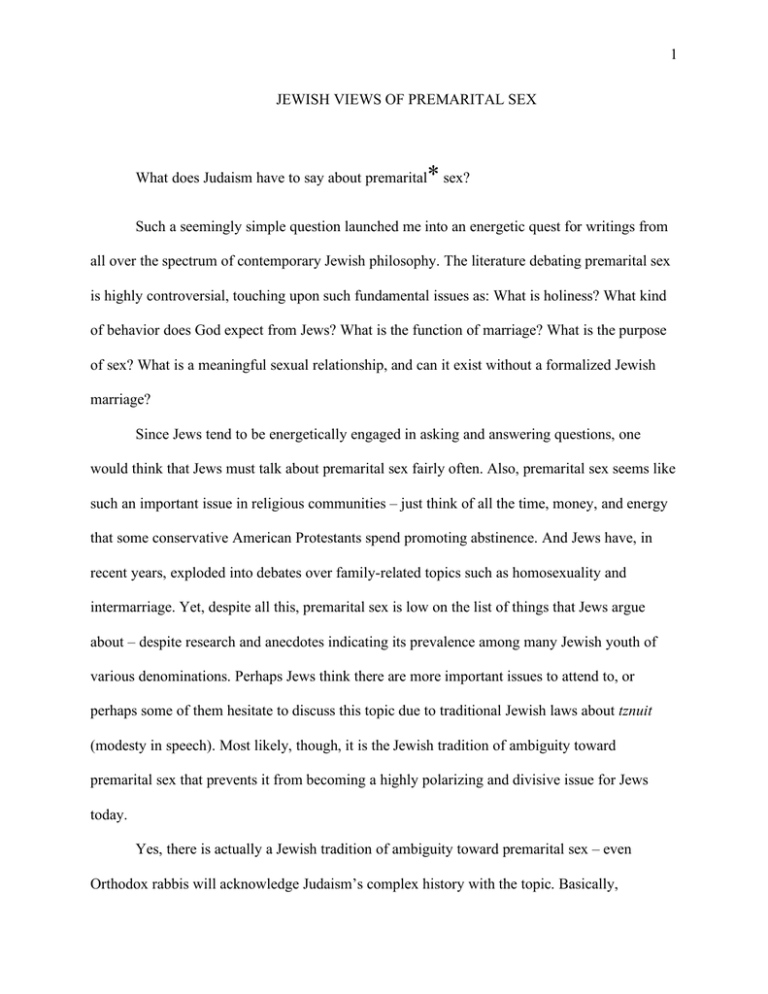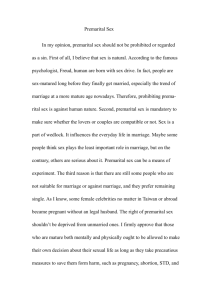
1
JEWISH VIEWS OF PREMARITAL SEX
* sex?
What does Judaism have to say about premarital
Such a seemingly simple question launched me into an energetic quest for writings from
all over the spectrum of contemporary Jewish philosophy. The literature debating premarital sex
is highly controversial, touching upon such fundamental issues as: What is holiness? What kind
of behavior does God expect from Jews? What is the function of marriage? What is the purpose
of sex? What is a meaningful sexual relationship, and can it exist without a formalized Jewish
marriage?
Since Jews tend to be energetically engaged in asking and answering questions, one
would think that Jews must talk about premarital sex fairly often. Also, premarital sex seems like
such an important issue in religious communities – just think of all the time, money, and energy
that some conservative American Protestants spend promoting abstinence. And Jews have, in
recent years, exploded into debates over family-related topics such as homosexuality and
intermarriage. Yet, despite all this, premarital sex is low on the list of things that Jews argue
about – despite research and anecdotes indicating its prevalence among many Jewish youth of
various denominations. Perhaps Jews think there are more important issues to attend to, or
perhaps some of them hesitate to discuss this topic due to traditional Jewish laws about tznuit
(modesty in speech). Most likely, though, it is the Jewish tradition of ambiguity toward
premarital sex that prevents it from becoming a highly polarizing and divisive issue for Jews
today.
Yes, there is actually a Jewish tradition of ambiguity toward premarital sex – even
Orthodox rabbis will acknowledge Judaism’s complex history with the topic. Basically,
2
according to Jewish tradition, premarital sex is neither accepted as valid (when compared with
marriage) nor condemned as severely sinful (when compared with prohibited sexual acts).
Premarital sex has probably existed in every Jewish community throughout history, and religious
authorities have varied in their responses to the behavior. Biblical sources seem to have
condoned premarital sex in many contexts, although later rabbinic commentators restricted this
liberality. Medieval rabbis debated whether premarital sex was acceptable or not. But this debate
gradually died down as more and more Jews saw heterosexual marriage as the proper place for
sex, at least in theory. (Keep in mind that ideals don’t always reflect actual behavior.) Generally,
traditional Jewish societies have discouraged premarital sex, attempting to strengthen marriage
and thereby to maintain Jewish religious, demographic, and cultural continuity in the face of
persecution.
Today, Jews are split over what to make of this historical legacy, especially since
premarital sex has become more acceptable in secular American society since the 1960s.
Orthodox views tend to discourage premarital sex. In their view, only marital sex provides
emotional, spiritual, and physical fulfillment for the sexual partners; produces children in a
healthy Jewish environment; and fortifies the Jewish home, anchor of the Jewish people in an era
of increasing assimilation. Sex outside of marriage erodes the psychological, spiritual, and
procreative value of sex, and undermines the societal strength of marriage. More liberal thinkers,
on the other hand, generally accept an unmarried couple’s choice as to whether or not to have
sex. In this view, sex outside of marriage can be perfectly valid for monogamous couples of all
sexual orientations, as long as the relationships adhere to certain codes of ethical conduct.
Marriage is not necessary for sex to be pleasurable or fulfilling, and premarital sex will not erode
the institution of marriage. Finally, individual Conservative thinkers tend to be divided between
3
the more liberal and the more traditional viewpoints. However, it is important to note that not all
individuals within each denomination agree with each other on the validity of and the conditions
for premarital sex.
As much as these different thinkers may disagree, most share at least one thing in
common: they promote the importance of sexual ethics in guiding sexual behavior. Most of my
sources, regardless of ideological background, take a strong stance against what they see as a
sexually unethical American society, reflected in practices such as one-night stands,
uncommitted sexual relationships, sex used to obtain favors, and exhibitionism. Liberal and
traditional thinkers alike oppose the commodification and hollowness of relationships based only
on sex, and they advocate for building meaningful connections between people in sexual
relationships. They disagree on how to build those meaningful connections (whether through
marriage or some other kind of commitment), but they do define their particular codes of sexual
ethics against the values (or lack thereof) of the dominant culture.
I’d like to address sexual ethics in further detail. The Feminist Sexual Ethics Project, of
which this paper is a part, seeks to discuss sexual ethics as it applies to women’s bodies and
lives. Although most of my sources don’t deal with explicitly feminist issues, they do bring up
some connections between premarital sex and feminist sexual ethics. Regardless of your stance
on premarital sex, the issue does raise important questions about how sexual relationships affect
the status of women.
Does premarital sex empower and liberate women to take charge of their own bodies, or
does it commodify their bodies into objects to be “sold” on the competitive dating market? Are
premarital sexual relationships fun and exploratory, or painful and predatory? Is a Jewishly
committed marriage the safest emotional place for a Jewish woman to explore her sexuality and
4
spirituality, or should she gain some experience and independence before making such a big
commitment? Has marriage historically been a way for men to control and exploit women’s
bodies and labor? Or is heterosexual marriage and procreation the blueprint that God intended
for the fulfillment of all Jewish women, their families, and the entire Jewish people?
Now, onto a more personal note: In my research, I’ve been continuously surprised at the
nuanced sophistication and thoughtfulness of much of the material I’ve seen. In my enthusiasm
to read every possible point of view on this subject, I’ve tracked down pieces by commentators
on Biblical, Talmudic, and later rabbinic texts; rabbis grappling with the real-life issues faced by
their congregants; theologians, historians, and thinkers from every walk of Jewish life;
researchers examining the sexual behavior of American Jews; and even a sex educator hoping to
integrate Jewish ethical values into her everyday work. Without this research project, I never
would have had a chance to read all this material, nor to examine all these points of view.
Because I want you to share the same thought-provoking experience I had, I’ve decided to
arrange my bibliography alphabetically rather than by ideological affiliation. (Don’t be thrown
off by the large number of liberal sources starting with A and B; it gets more diverse as you go
along, I promise.) I would recommend that you read the bibliography straight through, if you
can, and take time to hear the different voices that you otherwise might not have heard. I know it
takes a lot of time to read the entire thing, but I think you’ll agree with me that the topic is quite
intrinsically interesting. You might even want to look up and read some of these books, articles,
and websites, which should be available in a standard college library.
I hope all of the issues I’ve brought up give you some background before reading the
material that follows. Some of what follows might be difficult for you to absorb, if you adhere
strongly to a particular type of Jewish philosophy. In that case, I’d recommend you talk to a
5
rabbi, teacher, professor, or anyone else who could help you think through this topic. It’s okay if
you feel uncomfortable bringing up this subject with these authority figures, but keep in mind
that they’ve probably studied the issue before and may have counseled other people on it. (After
all, premarital sex has been an historical Jewish debate, and young Jews today have more
questions about it than ever before.)
***
I’ve particularly intended this bibliography for Jewish college students, although it
should be interesting to many people regardless of age, religion, gender, or educational status. I
hope this bibliography achieves its objectives:
•
to break down black-and-white misunderstandings about “what [Orthodox, Reform, etc.]
Jews think about premarital sex”;
•
to provide an impartial overview of what different Jewish writers have said (rather than to
promote a particular ideological point of view);
•
to encourage critical thinking about the issue;
•
to list high-quality print and electronic resources, for anyone seeking sources for
academic work, personal guidance, or just plain intellectual curiosity.
I would appreciate any questions or comments that come up for you. You may direct
your observations to fse_project@brandeis.edu.
A few more words about this page are in order.
•
* Heterosexual focus: Due to space and time limitations, I had to restrict this project to
an examination of views of heterosexual premarital sex. The issue of non-heterosexual
relationships, sexual activity, and marriage is far too complicated for me to cover here.
I’ve tried to correct for heterosexual bias in this bibliography, but it’s not always
6
possible. You’ll need to assume that, in this bibliography, any reference to “marriage,”
“marital,” “premarital,” etc. refers to heterosexual relationships and sexual activity,
unless stated otherwise.
•
Nationality: Most of my sources are by authors in the United States who write about
Jewish sexuality in that country. Since I have done my research exclusively in the United
States, it is really impossible for me to avoid this bias. However, the history of Jewish
attitudes toward sexuality has been shaped by the different regions in which Jews have
lived historically, so this bibliography carries that global influence in some way.
•
Wording: This bibliography deals with consensual sex between heterosexual unmarried
adults who may or may not marry in the future. There is some semantic confusion over
what to call this kind of sex. Some of my sources use “premarital sex” and “nonmarital
sex” interchangeably, while others see the former as implying some intention to marry in
the future, and the latter as implying no such intention. In this bibliography, I’ve tried to
avoid the issue of intention and just to use the terms interchangeably. To add a little
variety, I also use the phrases “unmarried sex” or “sex outside of marriage,” but those
should be considered interchangeable with the first two. Please note that by “nonmarital
sex” I do not mean adultery. Although a few of my sources deal with sex between an
unmarried woman and a married man (which they classify as nonmarital sex, for Jewish
legal reasons), the general issue of adultery is beyond the scope of this bibliography.
•
Spelling: I’ve tried the best I could to transliterate and define Hebrew words. I’ve also
quoted various authors who use different spellings of the same words, and I have not
attempted to standardize their spellings. For the purposes of this bibliography, the
7
definitions of the words are really more important than the details of how to transliterate
and pronounce the words properly.




